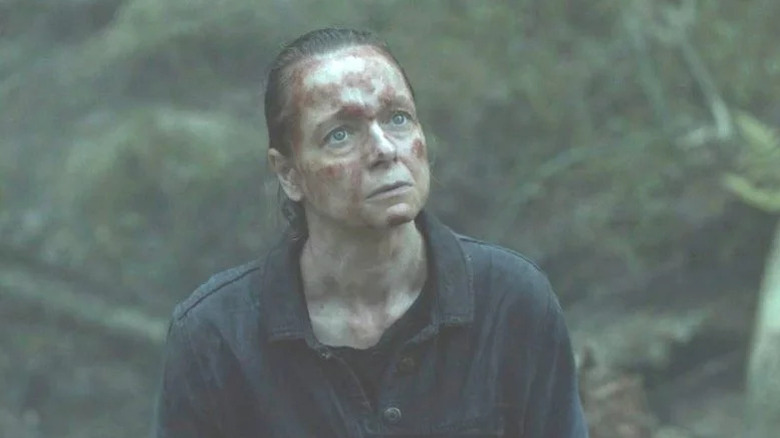Why The Walking Dead: World Beyond Only Lasted Two Seasons
Against the face of the obvious jokes about its name and nature, the "Walking Dead" franchise has walked, ran, and occasionally shambled along since its titular first show premiered in 2010. The horror-tinted post-apocalyptic drama has spawned so many spin-offs that /Film has a guide for the correct order to watch the "Walking Dead" shows, and there are absolutely no signs of the property stopping any time soon.
Out of the three multi-season "The Walking Dead" shows that have ended, the original enjoyed a very solid 11-season run and the first spin-off, "Fear the Walking Dead," tapped out after season 8. However, the second spin-off, "The Walking Dead: World Beyond," lasted only two seasons. The show — which, unlike most "The Walking Dead" projects, focused on teenage characters — ran from 2020 to 2021. While its short tenure might seem to indicate that it was a failed YA-themed experiment, "World Beyond" actually ended on its own terms. In a 2020 interview with Entertainment Weekly, showrunner Matt Negrette noted that the series was always meant to have a two-season arc:
"I think for all of us, we feel like we could write these characters forever. But, at the same time, it's nice to be able to approach a series from beginning to end kind of knowing what our ending is going to be and working towards that ending. It's not like, 'Oh, we'll see what happens in season 6,' or whatever. We're going to go two seasons. It's going to be 20 episodes total. It's challenging, because there's a lot we need to fit in those 20 episodes. But, at the same time, it's great to approach it knowing what you're working towards."
World Beyond isn't the only short The Walking Dead show
"The Walking Dead: World Beyond" isn't the only project in the franchise to have a pre-planned episode count. In fact, the series has dabbled with short-form storytelling many times over the years.
The best example of this is arguably "Tales of the Walking Dead," a 2022 anthology series that was one of the franchise's coolest spin-offs. Each of the six "Tales" episodes focuses on a different set of characters, both new and familiar, and how they deal with the post-apocalypse. The format allows the short series to explore the universe in ways a longer serialized show never could, and it uses this to explore fun concepts like the time loop in the episode "Blair/Gina" and the peculiar undead conservation area in "Amy/Dr. Everett." The show also reveals the full backstory of the mysterious Whisperer leader Alpha (Samantha Morton) from "The Walking Dead."
Another, more recent example of compact "The Walking Dead" storytelling is the costly "The Walking Dead: The Ones Who Live," which started as a planned trilogy of movies before the decision was made to turn it into a six-episode 2024 miniseries about the late-game adventures of Rick Grimes (Andrew Lincoln) and Michonne (Danai Gurira). There are also the "Walking Dead Webisodes," which ran periodically from 2011 to 2022. Each of these brief online storylines focused on a subject that was connected to the TV shows but not specifically covered by them. For instance, the six-part "The Walking Dead: The Red Machete" (2017-2018) focused on the periodically-seen machete known as "Mandy," charting how it made its way into Rick's hands and beyond. All in all, there's no shortage of "The Walking Dead" material for those who prefer to keep their undead-themed AMC entertainment bite-sized.

